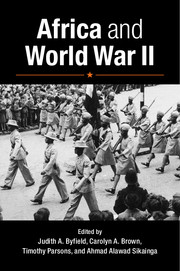Book contents
- Frontmatter
- Dedication
- Contents
- List of Contributors
- Acknowledgments
- Preface
- ONE INTRODUCTION
- TWO COLONIAL SUBJECTS AND IMPERIAL ARMIES
- THREE MOBILIZING COMMUNITIES AND RESOURCES FOR THE WAR EFFORT
- 8 Women, Rice, and War: Political and Economic Crisis in Wartime Abeokuta (Nigeria)
- 9 Africa's “Battle for Rubber” in the Second World War
- 10 Freetown and World War II: Strategic Militarization, Accommodation, and Resistance
- 11 Extraction and Labor in Equatorial Africa and Cameroon under Free French Rule
- 12 The Portuguese African Colonies during the Second World War
- 13 World War II and the Transformation of the Tanzanian Forests
- FOUR RACE, GENDER, AND SOCIAL CHANGE IN A TIME OF WAR
- FIVE EXPERIENCING WAR IN AFRICA AND EUROPE
- SIX WORLD WAR II AND ANTICOLONIALISM
- SEVEN CONCLUSION
- Index
12 - The Portuguese African Colonies during the Second World War
from THREE - MOBILIZING COMMUNITIES AND RESOURCES FOR THE WAR EFFORT
Published online by Cambridge University Press: 05 May 2015
- Frontmatter
- Dedication
- Contents
- List of Contributors
- Acknowledgments
- Preface
- ONE INTRODUCTION
- TWO COLONIAL SUBJECTS AND IMPERIAL ARMIES
- THREE MOBILIZING COMMUNITIES AND RESOURCES FOR THE WAR EFFORT
- 8 Women, Rice, and War: Political and Economic Crisis in Wartime Abeokuta (Nigeria)
- 9 Africa's “Battle for Rubber” in the Second World War
- 10 Freetown and World War II: Strategic Militarization, Accommodation, and Resistance
- 11 Extraction and Labor in Equatorial Africa and Cameroon under Free French Rule
- 12 The Portuguese African Colonies during the Second World War
- 13 World War II and the Transformation of the Tanzanian Forests
- FOUR RACE, GENDER, AND SOCIAL CHANGE IN A TIME OF WAR
- FIVE EXPERIENCING WAR IN AFRICA AND EUROPE
- SIX WORLD WAR II AND ANTICOLONIALISM
- SEVEN CONCLUSION
- Index
Summary
During the First World War, both Angola and Mozambique had become battlefields in the struggle between Germany and the Allies, and in 1940, the authorities in Portugal, Britain, and South Africa feared that history would repeat itself. Both the Allies and the Axis weighed up the advantages and disadvantages of occupying Portuguese territory or of forcing Portugal into the war on their side. German policy was to persuade Franco to enter the war as an Axis ally, a move that would secure Gibraltar and effectively close the Mediterranean to Britain. Portuguese neutrality then would be unsustainable. In the end the Germans settled for Iberian neutrality, satisfied with the willingness of Salazar, the Portuguese prime minister, to provide Germany with the vital strategic mineral, wolfram. Britain, like Germany, preferred Iberian neutrality but with the proviso that “should Spain enter the war against us [it was proposed] to seize and hold both the Cape Verde Islands and the Azores as soon as possible, irrespective of the attitude of the Portuguese.”
Salazar was in a delicate situation. If Franco entered the war on the side of Germany, Portugal would face the likelihood of German and Spanish invasion, since he was well aware that elements in both Spain and Germany considered the unification of the Iberian peninsula as a legitimate war aim. However, he knew that, if Portugal tried to save itself by entering the war as an Axis ally, Britain would seize the Portuguese colonies. Accordingly, Portuguese efforts were directed to persuading Spain of the benefits of remaining neutral. In July 1940, a protocol was agreed to by Spain and Portugal, which extended the Treaty of Friendship and Non-Aggression and gave “the belligerents the clear message that the Iberian powers had a common preference to remain at peace and to keep the war from the peninsula.”
- Type
- Chapter
- Information
- Africa and World War II , pp. 220 - 237Publisher: Cambridge University PressPrint publication year: 2015

